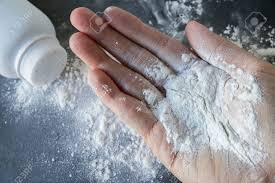Naming ceremonies for newborns are always a thing of joy. In most African countries, names are treated with great significance and hence the need for a ceremony to announce the name of the child with an occasion. This ceremony is usually one marked with gifts, refreshments and some other activities depending on the tradition of that place.
One usual practice in some naming ceremonies in some parts of Nigeria is rubbing of white powder. In some places, immediately after the birth of the child is announced, women around the neighborhood get white powder or white native chalk and rub it on their necks and faces.
This is common practice in Igbo land where they use nzu (white native chalk) as well as in Mambilla in Plateau state, Nigeria and they do this while singing joyous songs.
One usual practice in some naming ceremonies in some parts of Nigeria is rubbing of white powder. In some places, immediately after the birth of the child is announced, women around the neighborhood get white powder or white native chalk and rub it on their necks and faces.
This is common practice in Igbo land where they use nzu (white native chalk) as well as in Mambilla in Plateau state, Nigeria and they do this while singing joyous songs.

In other places, like in Idoma, a tribe in Benue state, Nigeria, the white powder is used on necks during the child's naming ceremony. This is usually done for everyone who took part in the naming ceremony. Other people however rub white powder on the neck of everyone who comes to visit the new baby.
Using of white powder at naming ceremonies and at the birth of the child is said to signify purity of heart, goodwill and welcome for the new child.
In some places, other items are also used during the naming ceremony. In Idoma, Palm oil is also a significant part of the naming ceremony. A drop of it is put in the baby’s mouth and everyone present at the naming ceremony will also taste the oil. It is said that tasting the oil is a sign of blessing for the baby.
In Yoruba land, things like honey, sugar, kolanut, bitter kola, alligator pepper, palmoil, sugar, sugarcane, salt, and alcohol are also used at naming ceremonies, all having different meanings.
Some other important activities at naming ceremonies are prayers said for the newborn and the parents, eating and drinking and of course, announcing the name of the child by the parents, the person officiating the ceremony or any member of the family.
Using of white powder at naming ceremonies and at the birth of the child is said to signify purity of heart, goodwill and welcome for the new child.
In some places, other items are also used during the naming ceremony. In Idoma, Palm oil is also a significant part of the naming ceremony. A drop of it is put in the baby’s mouth and everyone present at the naming ceremony will also taste the oil. It is said that tasting the oil is a sign of blessing for the baby.
In Yoruba land, things like honey, sugar, kolanut, bitter kola, alligator pepper, palmoil, sugar, sugarcane, salt, and alcohol are also used at naming ceremonies, all having different meanings.
Some other important activities at naming ceremonies are prayers said for the newborn and the parents, eating and drinking and of course, announcing the name of the child by the parents, the person officiating the ceremony or any member of the family.
